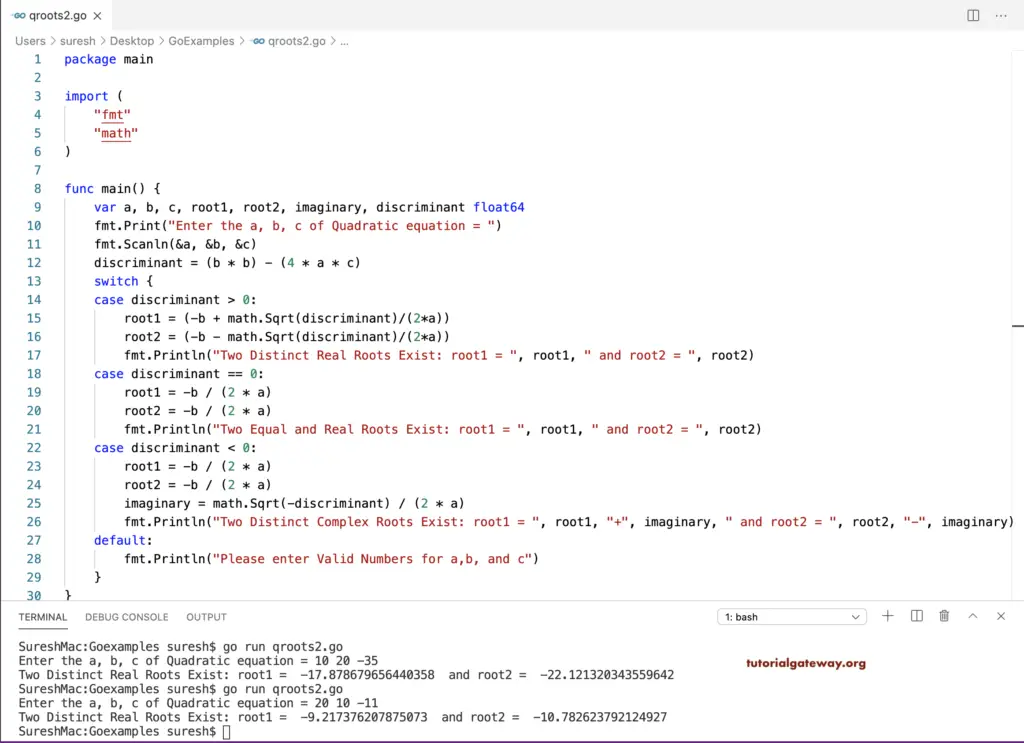Write a Go Program to Find Roots of a Quadratic Equation using If Else statement. The roots of a Quadratic Equation (ax2+bx+c) depends upon the discriminant value.
package main
import (
"fmt"
"math"
)
func main() {
var a, b, c, root1, root2, imaginary, discriminant float64
fmt.Print("Enter the a, b, c of Quadratic equation = ")
fmt.Scanln(&a, &b, &c)
discriminant = (b * b) - (4 * a * c)
if discriminant > 0 {
root1 = (-b + math.Sqrt(discriminant)/(2*a))
root2 = (-b - math.Sqrt(discriminant)/(2*a))
fmt.Println("Two Distinct Real Roots Exist: root1 = ", root1, " and root2 = ", root2)
} else if discriminant == 0 {
root1 = -b / (2 * a)
root2 = -b / (2 * a)
fmt.Println("Two Equal and Real Roots Exist: root1 = ", root1, " and root2 = ", root2)
} else if discriminant < 0 {
root1 = -b / (2 * a)
root2 = -b / (2 * a)
imaginary = math.Sqrt(-discriminant) / (2 * a)
fmt.Println("Two Distinct Complex Roots Exist: root1 = ", root1, "+", imaginary, " and root2 = ", root2, "-", imaginary)
}
}
SureshMac:GoExamples suresh$ go run qroots.go
Enter the a, b, c of Quadratic equation = 10 15 -25
Two Distinct Real Roots Exist: root1 = -13.25 and root2 = -16.75
SureshMac:GoExamples suresh$ go run qroots.go
Enter the a, b, c of Quadratic equation = 2 3 5
Two Distinct Complex Roots Exist: root1 = -0.75 + 1.3919410907075054 and root2 = -0.75 - 1.3919410907075054Golang Program to Find Roots of a Quadratic Equation using Switch Case
package main
import (
"fmt"
"math"
)
func main() {
var a, b, c, root1, root2, imaginary, discriminant float64
fmt.Print("Enter the a, b, c of Quadratic equation = ")
fmt.Scanln(&a, &b, &c)
discriminant = (b * b) - (4 * a * c)
switch {
case discriminant > 0:
root1 = (-b + math.Sqrt(discriminant)/(2*a))
root2 = (-b - math.Sqrt(discriminant)/(2*a))
fmt.Println("Two Distinct Real Roots Exist: root1 = ", root1, " and root2 = ", root2)
case discriminant == 0:
root1 = -b / (2 * a)
root2 = -b / (2 * a)
fmt.Println("Two Equal and Real Roots Exist: root1 = ", root1, " and root2 = ", root2)
case discriminant < 0:
root1 = -b / (2 * a)
root2 = -b / (2 * a)
imaginary = math.Sqrt(-discriminant) / (2 * a)
fmt.Println("Two Distinct Complex Roots Exist: root1 = ", root1, "+", imaginary, " and root2 = ", root2, "-", imaginary)
default:
fmt.Println("Please enter Valid Numbers for a,b, and c")
}
}

